六年级上册英语作文练习题Unit1-3
- 格式:doc
- 大小:147.50 KB
- 文档页数:2
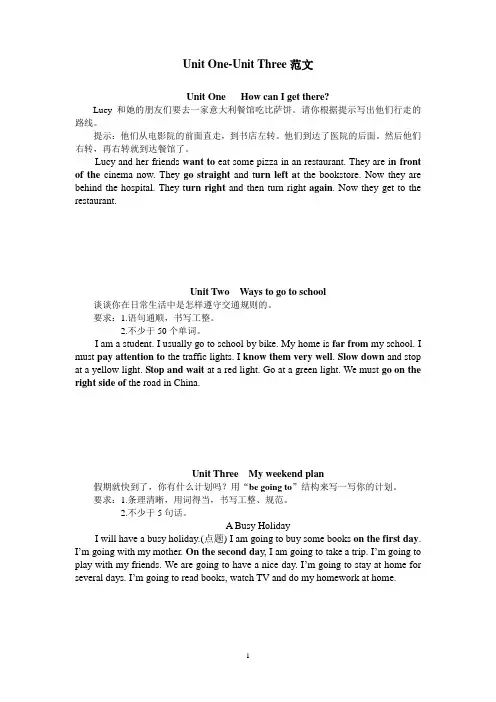
Unit One-Unit Three范文Unit One How can I get there?Lucy和她的朋友们要去一家意大利餐馆吃比萨饼。
请你根据提示写出他们行走的路线。
提示:他们从电影院的前面直走,到书店左转。
他们到达了医院的后面。
然后他们右转,再右转就到达餐馆了。
Lucy and her friends want to eat some pizza in an restaurant. They are i n front of the cinema now. They go straight and t urn left a t the bookstore. Now they are behind the hospital. They t urn right and then turn right again. Now they get to the restaurant.Unit Two Ways to go to school谈谈你在日常生活中是怎样遵守交通规则的。
要求:1.语句通顺,书写工整。
2.不少于50个单词。
I am a student. I usually go to school by bike. My home is far from my school. I must pay attention to the traffic lights. I know them very well. Slow down and stop at a yellow light. Stop and wait at a red light. Go at a green light. We must go on the right side of the road in China.Unit Three My weekend plan假期就快到了,你有什么计划吗?用“be going to”结构来写一写你的计划。
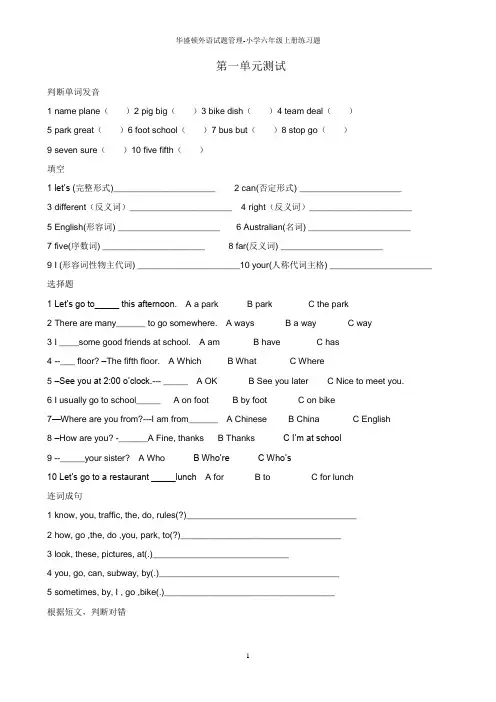
第一单元测试判断单词发音1 name plane()2 pig big()3 bike dish()4 team deal()5 park great()6 foot school()7 bus but()8 stop go()9 seven sure()10 five fifth()填空1 let’s (完整形式)_____________________2 can(否定形式) _____________________3 different(反义词)_____________________4 right(反义词)_____________________5 English(形容词) _____________________6 Australian(名词) _____________________7 five(序数词) _____________________ 8 far(反义词) _____________________9 I (形容词性物主代词) _____________________10 your(人称代词主格) _____________________ 选择题1 Let’s go to_____ this afternoon. A a park B park C the park2 There are many______ to go somewhere. A ways B a way C way3 I ____some good friends at school. A am B have C has4 --___ floor? –The fifth floor. A Which B What C Where5 –See you at 2:00 o’clock.--- _____ A OK B See you later C Nice to meet you.6 I usually go to school_____ A on foot B by foot C on bike7—Where are you from?---I am from______ A Chinese B China C English8 –How are you? -______A Fine, thanks B Thanks C I’m at school9 --_____your sister? A Who B Who’re C Who’s10 Let’s go to a restaurant _____lunch A for B to C for lunch连词成句1 know, you, traffic, the, do, rules(?)___________________________________2 how, go ,the, do ,you, park, to(?)_________________________________3 look, these, pictures, at(.)____________________________4 you, go, can, subway, by(.)_____________________________________5 sometimes, by, I , go ,bike(.)___________________________________根据短文,判断对错The traffic lights are the same in every country. There are always three lights: red, yellow and green. Red means ―Stop‖. Yellow means―Wait‖, and green mean―Go‖. In China , drivers drive on the right side of the road.(1) There are always three lights in every country. ( )(2) Yellow lights means ―Wait‖ ()(3) Red light means ―Go‖ ()(4) In China, drivers drive on the left side of the road. ( )(5) The traffic lights are the same in every country.( )选择发音不同的单词.1. A speak B beat C team D great2. A foot B good C zoo D look3. A must B music C sun D but4. A take B make C many D name5. A pig B bike C nice D time英汉互译1.go somewhere__________________ 2.bus stop__________________3.see you__________________ 4.traffic rules__________________5.in China__________________ 6.看__________________7.乘火车__________________ 8.走路__________________9.今天上午__________________ 10.到达公园__________________七. 情景对话()1.How are you this afternoon? A The fifth floor.()2.Which floor? B OK.()3.See you at 2 o’clock. C It’s near the post office.()4.Stop at a red light. D By plane.()5.Where is your home? E On foot.()6.How can I go to Paris? F Great.()7.What do you want? G See you then.()8.Let’s go to the cinema. H. Fine, thanks.()9.How can I go to school? I It’s 2 o’clock.()10.What’s the time?J Some grapes, please.八.将下列句子排成对话,将句子前的序号写在横线上.A. Fine, thank you.B. How do you go to school?C. How do you go to Paris?D. Sometimes by bike.E. Always by car, bus or plane.F. Sometimes by car.G. But I never go by train. H. Never on foot, never by bike. I. Good morning.J. Good morning. How are you today?1_____ 2_____ 3_____ 4_____ 5_____ 6_____ 7_____ 8_____ 9_____ 10_____九.阅读短文,回答问题.Mike: John, let’s go to the zoo this afternoon.John: Great! But how do we go to the zoo?Mike: It’s easy. Come to my home by subway. We can go to the bus stop on foot. Then we go to the zoo by bus.John: OK. But where is your home?Mike: My home is near the bank.John: Which floor.Mike: The second floor, Room 6B.John: OK! This afternoon. See you at 2 o’clock.Mike: See you then.1 How do Mike and John go to the zoo?_______________________________________________2 How do J ohn go to Mike’s home? _______________________________________________3 Where is Mike’s home? _______________________________________________4 Which floor did Mike live on? _______________________________________________5 What time did they meet? _______________________________________________十、改错1.Here are 15 dollar. ( )__________________A B C3.You can go to school by foot. ( )__________________A B C5.Fine, thanks you. And you? ( )__________________A B C2. The traffic lights are same in every country. ( )__________________A B C4.How are you at this morning? ( )__________________A B C第二单元测试判断下列单词发音1.cake take ( ) 2.that many ( ) 3.get very ( ) 4.cat gas ( )5.zest as ( ) 6.pig time ( ) 7.part start ( 8.post hospital ( ) 9.bus music ( ) 10.how now ( )英汉互译1.邮局_________ 2.书店___________3.与…相邻______________ 4.到达____________ 5.向左转______________ 6.science museum______________7.after school_____________ 8.a pair of _______________ 9.look for____________ 10.far from_________选择题1. I like English. ____you? A How are B Are C What about2. How can I ______ cinema? A get to the B get to C get the3. How many ____ do you have in the morning? A lesson B classes C a class4. It’s time ______to school. A go to B to going C to go5. –Where did you buy that? --______ A Twenty yuan B In the store C Ok, let’s go.6. Please come to the party______6 p.m _______Saturday.A at, on B in, in C on, in7. Please walk straight ____three minutes. A in B for C at8. The hospital is _____the left. A in B at C on9. –What’s the time now? –It’s _____ A Twenty-two B eight thirty C thirty eight10. Peter _____playing football, he’s a good football player. A likes B like C is like连词成句1.There, a, in, hospital, middle, the , is (.)____________________________________________ 2.How, I, get, the, museum, can, to (?)____________________________________________3.It, far, here, is ,from(?)_____________________________________4.Walk, for, south, minutes, three(.)_________________________________________5.Three, want, bananas, I (.)________________________________________从Ⅱ栏中找出Ⅰ栏的相应部分ⅠⅡ( )1. What day A. that young woman?( )2. I often B. is it tomorrow?( )3. Nice C. to meet you!( )4. I need D. do housework on Sundays.( )5.Who’s E. books are there?( )6. Whose F. are you today?( )7.How G.. go straight for ten minutes.( )8.Where’s H. this green T-shirt?( )9.Then I. the teache rs’ office?( )10.How many J: a box of crayons.将下列句子重新排列A.It’s next to the bank. B.I want to buy a pair of shoes. C.Where is the shoe store?D.You can go by the No.16 bus. E.Then walk straight for two minutes. F.What are you going to do? G.How can I get to the bank? H.Get off at the cinema. I.Thank you. J.The bank is on the right.1__________2__________3__________4__________5__________6__________7__________8__________9__________10__________阅读短文,回答问题.Dear Sarah,Please come to my twelfth birthday party at 6 p.m on Sunday. Now, let me tell you how to come:A. Start from the bus stop in front of the cinema.B. Take the No. 59 bus.C. Get off at the Science minutes.D. Walk straight for three minutes.E. Find the green house on the right.F. Look for me near the door.1. What color is Amy’s house?______________________________________________________2.How can Sarah get to Amy’s house?________________________________________________3.Where is the bus stop?___________________________________________________________4.How many minutes does Sarah walk?_______________________________________________选出与其他三个划线部分发音不同的单词.1 A cat B gas C fashion D many2 A get B evening C fetch D very3 A big B pig C time D this4 A son B box C not D stop5 A bus B music C but D up按要求写单词1.Where’s(完整形式) _________ 2.Next to(近义词) _______3.their(同音词) ________ 4.right(反义词) _________5.twelfth(基数词) _____________ 6.east(反义词) _________7.north(对应词) __________找出每组单词中与其他三个不同类的词1. A library B hospital C cinema D where2. A two B twelfth C twelve D twenty3. A what B who C white D whose4. A he B his C my D your5. A east B west C south D mouth6. A green B grey C glue D black7. A father B doctor C brother D mother8. A England B Canada C Australia D Chinese9. A plane B plant C subway D plane10. A cake B rice C bread D juice根据给出的情景,选出恰当的英文表达.1. 当你想问路时,你应该说:A. Excuse me,what time is it?B. Excuse me,how can t get to the post office?C. Excuse me,how much is it?2. 当你找到你的书的时候,你应该说:A. Here you are . B. How are you. C. Here it is.3. 当你请求帮助时,你应该说:A.Can you help me? B.Can I help you? C.I don’t want your help4. 当别人向你致谢时,你应该说:A.You’re right.B.No need. C.You’re welcome.5. 当你想知道对方的姓名时,你应该A. Who are you? B. What’s your name?C. I don’t know your name.阅读理解,判断正误.Amy: What are you going to do this Sunday?John: I want to buy some books. Where is the bookcase.Amy: It’s next to the cinema.John: How can I get to the cinema?Amy: You can go by No. 15 bus, or you can go on foot. It’s not far from here.John: Oh, I want to go there on foot. Thanks!Amy: That’s all right.1. John wants to buy some books on Saturday. ( )2. John knows how to get to the bookcase. ( )3. Amy knows how to get to the bookcase. ( )4. John can go by No.15 bus. ( )5. John wants to go there on foot. ( )第三单元测试判断单词发音1.week three ( )2.morning evening ( )3.must music ( )4.tasty name ( )5.father mother ( )6.nut bus ( )puter clothes( )8.have has ( )9.OK of ( ) 10.same some ( )英汉互译1.下周__________2.今天晚上__________3.漫画书__________4.明信片__________5.鞋店____________6.Fruit stand____________7.Take a trip____________8.Read a magazine_____________9.Go to the cinema___________10.The Great Wall_________选择题1. –How is your father today?-_____. A Fine, thank you B She’s thirty. C She’s from England.2. What are you going to do _____weekend? A a B this C these3. We are going to _____TV together. A look B look at C watch4. I’m going to the supermarket _____my mother. A and B with C together5. ______about you? A What B Where C Who6. Go straight ______five minutes. A in B at C for7. I want a pair of_____. A shoe B shoes C. shirts8. I can ______English songs. A dance B sing C singing9. I usually get up _____ 6:15 in the morning. A in B with C at10. The hospital is _____the left. A on B at C in将下列句子顺序整理成一段对话.A. How are you today?B. Nice to meet you.C. What are you going to buy?D. I’m going to the book store.E. I’m going at 3 o’clock.F. When are you going?G. Nice to meet you too. H. Where are you going this afternoon?I. Fine, thank you. J. I’m going to buy a comic book.答案:_______________________________________________________八、连词成句.1. going, learn, to, to, you, how, are , swim.(?)___________________________________2. you, have, books, do, comic(?)_____________________________________3. many, lessons, do, how, you, today, have(?)___________________________________4. sports, is ,what, favorite, your(?)_____________________________________5. it, far, here, is ,from(?)___________________________________情景对话( )1.May I come in? A. Me too.( )2.What are you going to buy? B. A pair of shoes.( )3.I like English very much. C. It’s two o’clock.( )4.When are you going? D. At two o’clock.( )5.Do you like bananas? E. No, it isn’t.( )6.Is it far? F. No, I don’t.( )7.What’s the time?G.. Come in, please.( )8.Nice to meet you. H. I’m sorry.( )9.Let’s go and have a look.I. Nice to meet you, too.( )10.Please don’t stand here.J. OK, let’s go.阅读短文,回答问题.Amy: What are you going to do this Sunday? Sarah: I’m going to plant trees.Amy: Plant trees? Sarah: Yes. I need some plants. So I’m going to the plant shop.Amy: Are you going to use any books?Sarah: Yes, I’m going to the bookstore. I need a magazine about plants.Amy: That’s great! Let’s go!1. What is Sarah going to do this Sunday?____________________________________2. Where is Sarah going to buy plants?______________________________________3. What else does Sarah buy?_____________________________________4. Where is Sarah going to buy the magazine?_____________________________________5. Does Sarah go with Amy?____________________________________选出发音不同的单词.1. A morning B evening C think D thin2. A tonight B tomorrow C to D together3. A park B walk C far D car4. A plane B but C book D bike5. A right B light C night D eight按要求改词1.teacher(动词) ________2.that(对应词) ______3.right(反义词) ______4.first(基数词) ______5.old(反义词) _______6.can’t(完整形式) _______7.south(反义词) _______8.watch(复数) ______ 9.English(国名) ______10.is not(缩略形式) _______用所给的词填空(up, down, in ,be, behind, next, how, on ,who’s, whose)1. What are going to do ___________ 20 years’ time?2. I’m going to walk___________ the moon.3. I want to ___________ a computer expert.4. There is a football ___________ the door.5. ___________ that girl?6. ___________ comic books are those?7. Come here and sit ___________, please. 8. The cinema is ___________ to the bank.9. ___________ are you today? 10. Stand ___________, please.按要求改写句子。
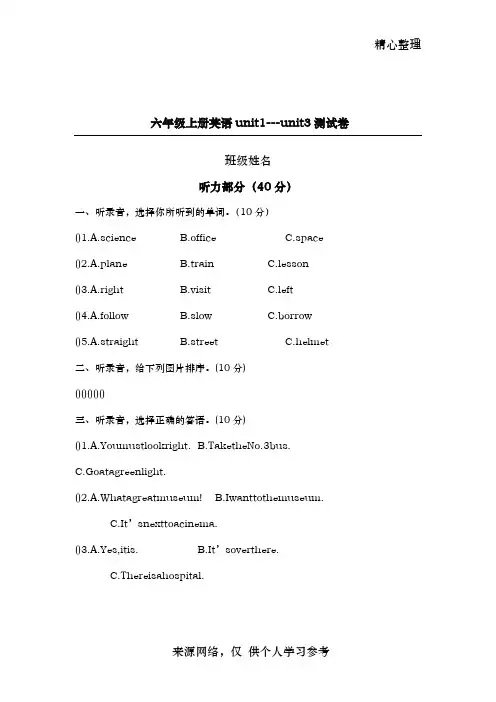
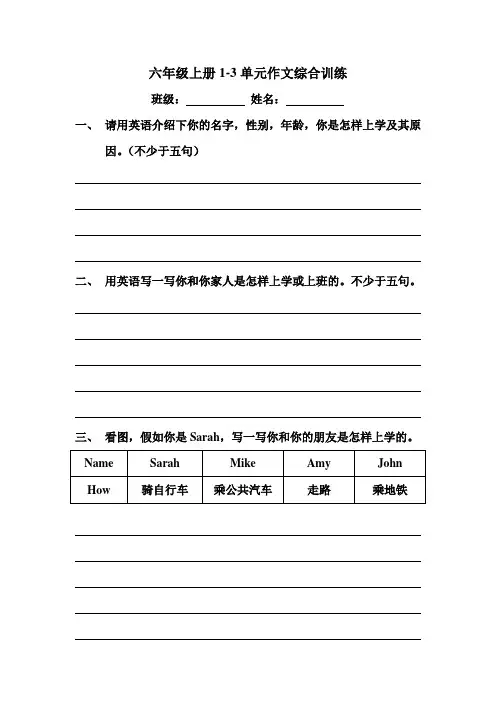
六年级上册1-3单元作文综合训练
班级:姓名:
一、请用英语介绍下你的名字,性别,年龄,你是怎样上学及其原
因。
(不少于五句)
二、用英语写一写你和你家人是怎样上学或上班的。
不少于五句。
三、看图,假如你是Sarah,写一写你和你的朋友是怎样上学的。
四、Amy今天下午一起去公园,写一写你
们怎样去,几点去。
(不少于五句)
五、Mike是这个城市的陌生人,他想去医院,但是不知道怎么去,
(不少于五句)
六、看图,写一写你是怎样从家里去图书馆的,注意用上first, then,
next, at last等词。
(不少于五句)
七、写一写你的周末计划。
(不少于五句)
八、以My weekend为题,要求写出:你周末打算去书店,什么时
候去,去买什么,怎样去,和谁去,心情如何。
(不少于五句)
九、看图,假如你是Mike,写一写你的周末计划。
(不少于五句)
十、看图,介绍你朋友Amy的周末计划。
(不少于五句)。
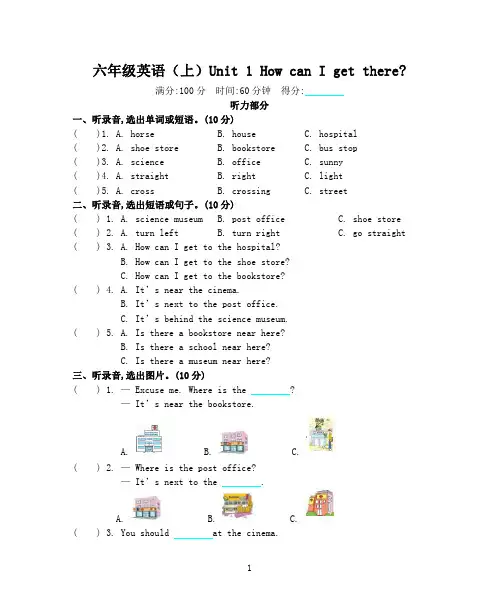
六年级英语(上)Unit1How can I get there?满分:100分时间:60分钟得分:听力部分一、听录音,选出单词或短语。
(10分)()1.A.horse B.house C.hospital()2.A.shoe store B.bookstore C.bus stop()3.A.science B.office C.sunny()4.A.straight B.right C.light()5.A.cross B.crossing C.street二、听录音,选出短语或句子。
(10分)()1.A.science museum B.post office C.shoe store ()2.A.turn left B.turn right C.go straight ()3.A.How can I get to the hospital?B.How can I get to the shoe store?C.How can I get to the bookstore?()4.A.It’s near the cinema.B.It’s next to the post office.C.It’s behind the science museum.()5.A.Is there a bookstore near here?B.Is there a school near here?C.Is there a museum near here?三、听录音,选出图片。
(10分)()1.—Excuse me.Where is the?—It’s near the bookstore.A. B. C.()2.—Where is the post office?—It’s next to the.A. B. C.()3.You should at the cinema.A. B. C.()4.How can I get to the,please?A. B. C.()5.—Where can I buy it?—You can buy it in the.A. B. C.笔试部分四、根据句意及首字母提示,补全单词。
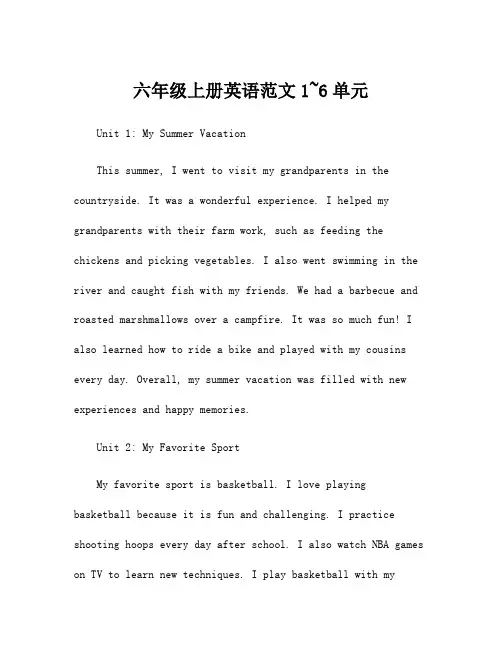
六年级上册英语范文1~6单元Unit 1: My Summer VacationThis summer, I went to visit my grandparents in the countryside. It was a wonderful experience. I helped my grandparents with their farm work, such as feeding the chickens and picking vegetables. I also went swimming in the river and caught fish with my friends. We had a barbecue and roasted marshmallows over a campfire. It was so much fun! I also learned how to ride a bike and played with my cousins every day. Overall, my summer vacation was filled with new experiences and happy memories.Unit 2: My Favorite SportMy favorite sport is basketball. I love playing basketball because it is fun and challenging. I practice shooting hoops every day after school. I also watch NBA games on TV to learn new techniques. I play basketball with myfriends on weekends at the local court. We have a great time competing and cheering each other on. Basketball helps me stay active and fit. It is not only a sport but also a way to bond with my friends. I hope to continue playing basketball for many years to come.Unit 3: My Best FriendMy best friend's name is Sara. We have been friends since we were in kindergarten. Sara is kind, funny, and always there for me when I need her. We love doing everything together, from playing video games to studying for exams. Sara has a great sense of humor and can always make me laugh. She is also a good listener and gives me great advice when I am feeling down. I am lucky to have Sara as my best friend, and I cherish our friendship every day.Unit 4: A Memorable BirthdayLast year, I had a memorable birthday celebration. My family threw a surprise party for me at the local park. Allmy friends and relatives were there, and we had a wonderful time. There were balloons, streamers, and a big birthday cake with my name on it. We played games, danced, and opened presents together. I felt so loved and happy surrounded by my loved ones. The best part of the day was blowing out the candles on the cake and making a wish. It was a birthday Iwill never forget.Unit 5: A Trip to the ZooLast weekend, my family and I took a trip to the zoo. It was a fantastic experience seeing so many different animalsup close. We saw lions, tigers, elephants, giraffes, and many more. My favorite animals were the monkeys swinging from tree to tree. We also watched a sea lion show and rode on a train around the zoo. It was a fun and educational day for everyone.I learned a lot about different animal species and their habitats. Visiting the zoo was a great way to appreciate the beauty of nature.Unit 6: My Dream VacationMy dream vacation is to visit the Great Wall of China. I have always been fascinated by the history and culture of China. I want to see the magnificent structure of the Great Wall with my own eyes. I also want to explore the bustling city of Beijing and try authentic Chinese cuisine. I imagine walking along the ancient walls, taking in the breathtaking views of the surrounding mountains. It would be a once-in-a-lifetime experience that I will never forget. I hope to make my dream vacation come true one day.。
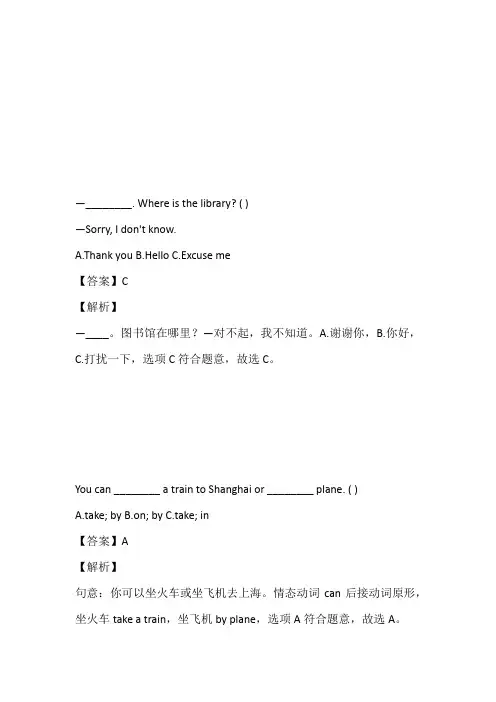
—________. Where is the library? ( )—Sorry, I don't know.A.Thank youB.HelloC.Excuse me【答案】C【解析】—____。
图书馆在哪里?—对不起,我不知道。
A.谢谢你,B.你好,C.打扰一下,选项C符合题意,故选C。
You can ________ a train to Shanghai or ________ plane. ( )A.take; byB.on; byC.take; in【答案】A【解析】句意:你可以坐火车或坐飞机去上海。
情态动词can后接动词原形,坐火车take a train,坐飞机by plane,选项A符合题意,故选A。
—Look, the traffic light is red! ( )—________A.Let's go.B.Let's stop and wait.C.Don't stop!【答案】B【解析】句意:—看,交通灯是红色的!—_____。
根据交通规则,红灯是禁止通行,A.我们走,B.让我们停下来等着,C.不要停,选项B符合题意,故选B。
Let’s go to the ______ to see a film. ( )A.cinemaB.bookstoreC.library【答案】A【解析】句意:让我们去____去看电影。
本题考查的是地点名词辨析。
cinema 电影院,bookstore书店,library图书馆。
根据see a film看电影可知,应是去电影院。
故选A。
Why ________ go on Tuesday? It's half price then! ( )A.noB.notC.don't【答案】B【解析】句意:为什么不星期二去呢?那时候半价!why don't + 主语+ 动词,why not一定要直接跟动词,选项B符合题意,故选B。
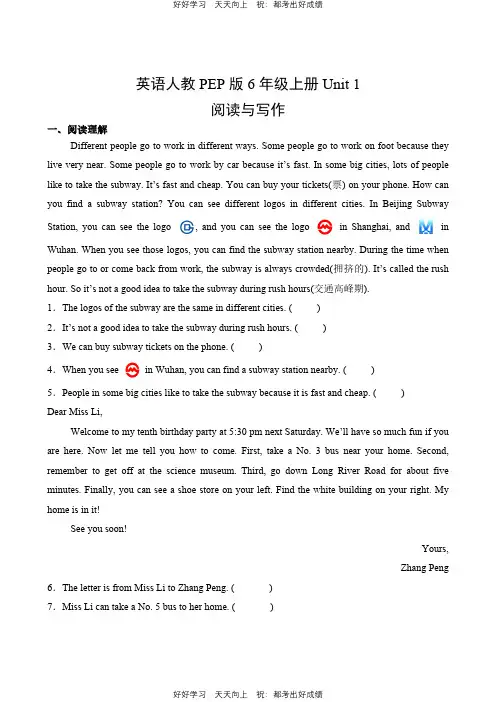
英语人教PEP版6年级上册Unit 1阅读与写作一、阅读理解Different people go to work in different ways. Some people go to work on foot because they live very near. Some people go to work by car because it’s fast. In some big cities, lots of people like to take the subway. It’s fast and cheap. You can buy your tickets(票) on your phone. How can you find a subway station? You can see different logos in different cities. In Beijing SubwayStation, you can see the logo , and you can see the logo in Shanghai, and in Wuhan. When you see those logos, you can find the subway station nearby. During the time when people go to or come back from work, the subway is always crowded(拥挤的). It’s called the rush hour. So it’s not a good idea to take the subway during rush hours(交通高峰期).1.The logos of the subway are the same in different cities. ( )2.It’s not a good idea to take the subway during rush hours. ( )3.We can buy subway tickets on the phone. ( )4.When you see in Wuhan, you can find a subway station nearby. ( )5.People in some big cities like to take the subway because it is fast and cheap. ( )Dear Miss Li,Welcome to my tenth birthday party at 5:30 pm next Saturday. We’ll have so much fun if you are here. Now let me tell you how to come. First, take a No. 3 bus near your home. Second, remember to get off at the science museum. Third, go down Long River Road for about five minutes. Finally, you can see a shoe store on your left. Find the white building on your right. My home is in it!See you soon!Yours,Zhang Peng 6.The letter is from Miss Li to Zhang Peng. ( )7.Miss Li can take a No. 5 bus to her home. ( )8.The color of the building isn’t white. ( )9.There is a shoe store near Zhang Peng’s home. ( )10.Zhang Peng’s home is on the left of Miss Li. ( )(Wu Yifan is asking a man on the street.)Wu Yifan: Excuse me. Where is the supermarket, please?Man: It’s next to the bookstore.Wu Yifan: Is it far from here?Man: No, it’s not far.Wu Yifan: How can I get there?Man: First, go straight and turn right at the cinema. Then turn left at the post office. Go straight for five minutes. You can find the supermarket on your left.Wu Yifan: Thank you.Man: You’re welcome.11.The man wants to go to the supermarket. ( )12.The hospital is next to the supermarkets. ( )13.Wu Yifan should turn right at the cinema. ( )14.Wu Yifan should turn left at the post office. ( )15.The supermarket is far from here. ( )Reading. 读一读,回答问题。
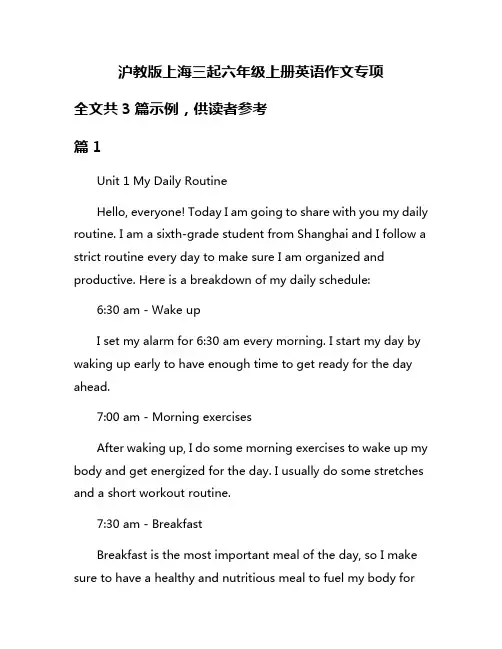
沪教版上海三起六年级上册英语作文专项全文共3篇示例,供读者参考篇1Unit 1 My Daily RoutineHello, everyone! Today I am going to share with you my daily routine. I am a sixth-grade student from Shanghai and I follow a strict routine every day to make sure I am organized and productive. Here is a breakdown of my daily schedule:6:30 am - Wake upI set my alarm for 6:30 am every morning. I start my day by waking up early to have enough time to get ready for the day ahead.7:00 am - Morning exercisesAfter waking up, I do some morning exercises to wake up my body and get energized for the day. I usually do some stretches and a short workout routine.7:30 am - BreakfastBreakfast is the most important meal of the day, so I make sure to have a healthy and nutritious meal to fuel my body forthe day ahead. I usually have a bowl of oatmeal with fruits and a glass of milk.8:00 am - SchoolI leave for school at 8:00 am. My school is just a short walk away from my house, so I enjoy the fresh air and take in the sights of the neighborhood on my way to school.8:30 am - ClassesSchool starts at 8:30 am. I have different classes throughout the day, including English, Math, Science, and Chinese. I pay attention and participate actively in all my classes to make the most of my learning experience.12:00 pm - LunchI have lunch at school with my classmates. We usually have a variety of options to choose from, including rice, vegetables, and meat dishes. I make sure to eat a balanced meal to keep my energy levels up for the rest of the day.1:00 pm - Afternoon classesAfter lunch, we have more classes in the afternoon. This is when we have subjects like art, music, and PE. I enjoy theseclasses as they allow me to express myself creatively and stay active.4:00 pm - After-school activitiesAfter school, I have various after-school activities, such as sports practice, music lessons, or tutoring sessions. I enjoy these activities as they help me develop new skills and interests.6:00 pm - DinnerI have dinner with my family at 6:00 pm. We sit down together and enjoy a home-cooked meal. We talk about our day and share stories with each other.7:00 pm - HomeworkAfter dinner, I do my homework to review what I have learned in class and prepare for the next day. I make sure to finish my homework before bedtime to avoid any last-minute stress.9:00 pm - RelaxationBefore bedtime, I take some time to relax and unwind. I read a book, listen to music, or watch a movie to wind down from the day.10:00 pm - BedtimeI go to bed at 10:00 pm to ensure I get enough rest for the next day. I make sure to have a good night's sleep, so I am refreshed and ready to tackle the challenges of the next day.That wraps up my daily routine. I hope you found it interesting and maybe even inspiring. Remember, having a daily routine can help you stay organized and productive, so give it a try and see the positive impact it can have on your life. Thank you for reading!篇2Title: Special Topics on English Composition in Grade 4 and Grade 6 Shanghai Teaching EditionIntroduction:English composition is an important aspect of language learning for students at Grade 4 and Grade 6 in Shanghai. In the Shanghai Teaching Edition, there are three specific topics covered in the curriculum to help students enhance their writing skills. In this document, we will explore these topics in detail and provide useful tips for students to excel in English composition.Topic 1: Descriptive WritingDescriptive writing is a common form of composition in which students are required to vividly describe a person, place, object, or event. In Grade 4, students are introduced to basic vocabulary and sentence structures to describe simple things around them. By Grade 6, students are expected to write longer and more detailed descriptions using a variety of adjectives, adverbs, and sensory details.Tips for Descriptive Writing:1. Use descriptive language to create a vivid picture in the reader's mind.2. Include sensory details such as sight, sound, smell, taste, and touch to make the description more engaging.3. Organize the description logically by starting with an introduction, followed by descriptive details, and ending with a conclusion.Topic 2: Narrative WritingNarrative writing involves telling a story or recounting an event. In Grade 4, students are encouraged to write simple stories with a clear beginning, middle, and end. By Grade 6, students are expected to write more complex narratives with well-developed characters, settings, and plotlines.Tips for Narrative Writing:1. Develop interesting characters with distinct personalities and motivations.2. Create a vivid setting by describing the time and place in which the story takes place.3. Build suspense and tension by including a problem or conflict that needs to be resolved.4. Use dialogue to bring characters to life and move the story forward.Topic 3: Persuasive WritingPersuasive writing involves convincing the reader to agree with a particular point of view or take a specific action. In Grade 4, students are introduced to persuasive techniques such as using persuasive language, providing reasons and evidence, and addressing counterarguments. By Grade 6, students are expected to develop more sophisticated arguments and use rhetorical devices to persuade the reader.Tips for Persuasive Writing:1. Clearly state your position or opinion at the beginning of the essay.2. Present strong arguments supported by evidence and examples.3. Address and refute counterarguments to strengthen your position.4. Use persuasive language and rhetorical devices such as anecdotes, analogies, and statistics to persuade the reader.Conclusion:English composition is an essential skill that students in Grade 4 and Grade 6 in Shanghai need to master. By focusing on descriptive writing, narrative writing, and persuasive writing, students can improve their writing skills and become effective communicators. By following the tips provided in this document, students can excel in English composition and achieve academic success.篇3The Shanghai Primary School English curriculum has been designed with the aim of developing students' language skills in a progressive and structured manner. In the third and sixth grade level, students are exposed to a wide range of topics and activities that aim to improve their writing skills.One key aspect of the English curriculum at this level is the focus on improving students' writing skills through various writing tasks and activities. These tasks help students to develop their creativity, critical thinking, and communication skills.In the third and sixth grade level, students are introduced to different types of writing such as narrative writing, descriptive writing, persuasive writing, and expository writing. They are also taught basic writing structures, vocabulary, and grammar rules that can help them write effectively.One important aspect of writing that students focus on is the ability to organize their thoughts and ideas in a coherent and logical manner. They are taught how to brainstorm ideas, plan their writing, draft and revise their work, and finally, edit and proofread their writing for errors.To help students improve their writing skills, teachers use a variety of teaching strategies such as modeling, scaffolding, peer editing, and providing feedback. Students are also given opportunities to practice their writing skills through class activities, homework assignments, and assessments.Overall, the Shanghai Primary School English curriculum for the third and sixth grade level provides a solid foundation for students to develop their writing skills. Through engagingactivities and focused instruction, students are able to improve their writing abilities and become more confident and competent writers.。
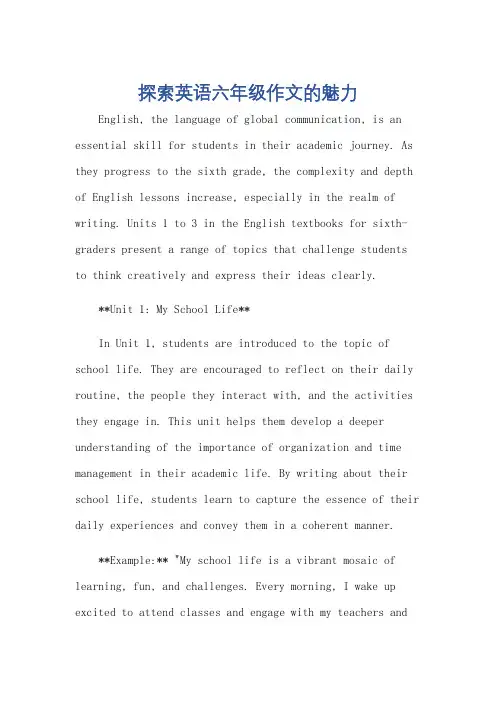
探索英语六年级作文的魅力English, the language of global communication, is an essential skill for students in their academic journey. As they progress to the sixth grade, the complexity and depth of English lessons increase, especially in the realm of writing. Units 1 to 3 in the English textbooks for sixth-graders present a range of topics that challenge students to think creatively and express their ideas clearly.**Unit 1: My School Life**In Unit 1, students are introduced to the topic of school life. They are encouraged to reflect on their daily routine, the people they interact with, and the activities they engage in. This unit helps them develop a deeper understanding of the importance of organization and time management in their academic life. By writing about their school life, students learn to capture the essence of their daily experiences and convey them in a coherent manner.**Example:** "My school life is a vibrant mosaic of learning, fun, and challenges. Every morning, I wake up excited to attend classes and engage with my teachers andclassmates. The lessons are interactive and engaging, allowing me to explore new concepts and ideas. During breaks, I enjoy playing with my friends and participatingin various extracurricular activities. This balance of learning and fun makes my school life enriching and rewarding."**Unit 2: My Favorite Season**Unit 2 focuses on the concept of seasons and their influence on people's lives. Students are asked to identify their favorite season and explain the reasons behind their choice. This unit encourages them to observe and appreciate the natural world, as well as to cultivate a sense of gratitude for the blessings of nature. Through writing, students learn to describe the unique characteristics of each season and express their emotional connection to them. **Example:** "My favorite season is autumn. The air is crisp and invigorating, and the leaves turn a stunning array of colors. The scenery is breathtaking, and it brings a sense of peace and tranquility. Furthermore, autumn is a time forharvest, symbolizing abundance and renewal. Thechanging of the seasons reminds us of the cycles of lifeand the importance of cherishing each moment."**Unit 3: My Dream Job**In Unit 3, students are prompted to think about their future careers and identify their dream jobs. This unit helps them develop a sense of direction and purpose, encouraging them to envision a fulfilling career path. Through writing, students learn to articulate their career aspirations, the reasons behind them, and the steps they plan to take to achieve their goals.**Example:** "My dream job is to become a scientist. I am fascinated by the idea of exploring the unknown and making contributions to human knowledge. As a scientist, I hope to contribute to the advancement of science and technology, finding solutions to pressing issues likeclimate change and disease. To achieve this dream, I planto focus on my studies, develop my critical thinking skills, and participate in research projects."The three units in the English textbooks for sixth-graders provide rich opportunities for students to enhance their writing skills and develop a deeper understanding ofvarious topics. Through writing about their school life, favorite season, and dream job, students learn to express their ideas clearly, observe and appreciate the world around them, and cultivate a sense of purpose and direction for their future. These lessons are not just about grammar and vocabulary; they are about fostering a life-long love for learning and the joy of expression through the medium of English.。
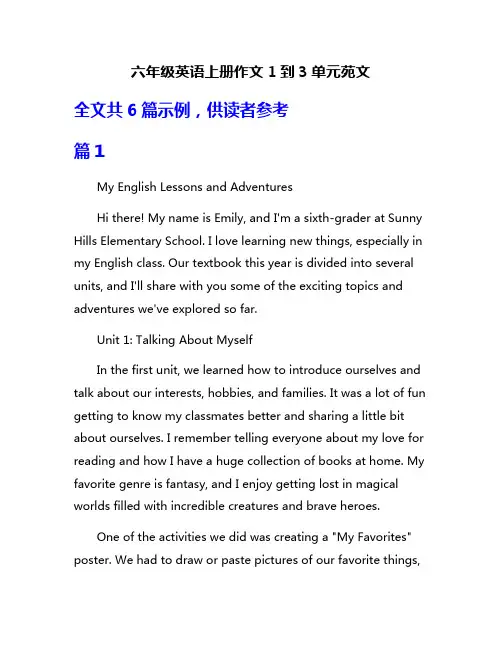
六年级英语上册作文1到3单元苑文全文共6篇示例,供读者参考篇1My English Lessons and AdventuresHi there! My name is Emily, and I'm a sixth-grader at Sunny Hills Elementary School. I love learning new things, especially in my English class. Our textbook this year is divided into several units, and I'll share with you some of the exciting topics and adventures we've explored so far.Unit 1: Talking About MyselfIn the first unit, we learned how to introduce ourselves and talk about our interests, hobbies, and families. It was a lot of fun getting to know my classmates better and sharing a little bit about ourselves. I remember telling everyone about my love for reading and how I have a huge collection of books at home. My favorite genre is fantasy, and I enjoy getting lost in magical worlds filled with incredible creatures and brave heroes.One of the activities we did was creating a "My Favorites" poster. We had to draw or paste pictures of our favorite things,like foods, movies, books, and more. I put my favorite book series, "The Chronicles of Narnia," front and center on my poster. When we presented our posters to the class, I learned so many interesting things about my friends' likes and dislikes.Unit 2: My Daily RoutineThe second unit focused on our daily routines and habits. We learned how to describe our morning and evening activities, as well as our school schedules. I found it fascinating to see how different everyone's routines were, even though we all attend the same school.My favorite part of this unit was when we had to write a short story about an exciting or unusual day in our lives. I wrote about the time my family and I went on a camping trip, and we got caught in a thunderstorm. It was a bit scary at first, but we ended up having so much fun singing songs and telling stories in our tent while the rain poured outside.During this unit, we also learned about the importance of developing good habits, like exercising regularly, getting enough sleep, and eating a balanced diet. Our teacher even brought in a guest speaker who taught us some simple yoga poses and breathing exercises to help us relax and stay focused.Unit 3: My School LifeThe third unit revolved around our school experiences and activities. We learned how to describe our classrooms, subjects, teachers, and extracurricular activities. It was great to see how much we all had in common, despite our different interests and personalities.One of the highlights of this unit was when we had to give a presentation about our favorite subject or school activity. I chose to talk about my love for art class. I showed some of my drawings and paintings and explained how creating art helps me express my feelings and explore my creativity.We also learned about the different roles and responsibilities of people in our school community, such as teachers, principals, librarians, and cafeteria workers. It made me appreciate all the hard work they do to ensure we have a great learning environment.One of my favorite activities in this unit was when we had to create a school newsletter. We formed small groups and each group was responsible for a different section, like news, sports, arts, and more. It was a lot of work, but it was so rewarding to see our final product and share it with the whole school.Looking Back and AheadAs I look back on these first three units, I realize how much I've learned and grown, not just in my English skills but also in my understanding of myself and the world around me. I've gained confidence in expressing myself and have developed a deeper appreciation for the diversity of experiences and perspectives among my classmates.I can't wait to see what the next units have in store for us. I know there will be more exciting adventures, more opportunities to learn and explore, and more chances to make wonderful memories with my friends and teachers.Learning English has been an amazing journey so far, and I'm excited to see where it will take me next. Who knows, maybe one day I'll become a famous author and write my own books that inspire and captivate readers around the world!篇2My Journey Through 6th Grade English Units 1-3Hey there! I'm a 6th grade student and I've just finished the first three units of our new English textbook. What a wild ride it's been so far! In Unit 1, we learned all about people's hobbies andinterests. Units 2 and 3 took us into the worlds of sports and music. I've gained some cool new knowledge that I can't wait to share with you!Unit 1: Hobbies Galore!This unit was all about the activities people enjoy in their free time. We learned vocabulary words like "collecting", "gardening", "hiking", and "volunteering". My personal favorite hobby is reading comic books and graphic novels. There's just something magical about getting lost in those bright, vivid panels filled with heroes, humor, and adventure!One of the reading passages was about a girl named Maggie who loved rebuilding old computers as a hobby. She would find discarded or broken PCs, take them apart, and put them back together again with new components. Sometimes she would even build entirely new machines from spare parts! Isn't that just mind-blowing? I'm pretty handy with technology myself, but I don't think I'm quite at Maggie's level yet.We also learned how to talk about hobbies using different tenses like the simple present ("I read comics every day") and present continuous ("I am reading a really exciting comic right now"). By the end of the unit, I felt confident discussing and describing all kinds of interests and pastimes.Unit 2: The Wide World of SportsOnto Unit 2, which was a real home run! We learned tons of sports vocabulary like "teammate", "opponent", "score", and "victory". The unit had me dreaming about becoming a famous athlete one day. Maybe I could be a star basketball player and slam dunk my way into the history books!My favorite reading was about a teenage girl named Maya who was a talented soccer player. Despite facing injury setbacks, she worked hard, stayed determined, and made it onto her school's varsity team. Maya's story taught me that with the right mindset and effort, you can overcome almost any obstacle. I definitely needed to hear that inspirational message.We covered all the cool rules and equipment for games like baseball, tennis, and gymnastics. Oh, and don't get me started on the awesome dialogue exercises where we had to act out little sports scenes! "And the crowd goes wild as Jones smashes the tennis ball for a winning cross-court shot!" I may have gotten a little too theatrical during those...Unit 3: The Rhythm of MusicLast but not least, we grooved our way into Unit 3 which was all about music, music, music! I'm a huge fan of pop and hip-hop,so I was stoked to learn words like "vocals", "bassist", "lyrics", and "remix". We read all about different genres from classical to rock to country.One of the readings described a Japanese drum troupe that performed these mesmerizing percussive numbers with absolute perfection. I can't even begin to imagine how long they must have practiced to achieve that level of coordination and skill. That story definitely gave me a new appreciation for musical discipline!My absolute favorite activity, however, was the one where we had to analyze the meanings of different song lyrics. We looked at tunes across genres and времен and tried to interpret the deeper messages and poetry. I found myself really digging into the nuances of the language to uncover the intended emotions and themes. Looking at lyrics kind of made me want to become a songwriter myself one day...Whew, That Was a Lot to Take In!Well, those were Units 1 through 3 of 6th grade English in a nutshell (or maybe a bigger shell since it was over 2000 words!). Between hobbies, sports, and music, my mind's been saturated with so much new knowledge over the past few weeks.Sometimes I feel like the textbook is just cramming information into my brain!But you know what? I'm actually really excited to keep learning and exploring all the amazing topics, stories, and skills we'll cover throughout the rest of the school year. English is such a rich, expressive, and versatile language. I may be just a 6th grader, but I'm determined to master it and open up a world of communication, creativity and understanding.Let the linguistic journey continue! Thanks for rocking with me through this long essay recap. I'll catch you on the flip side!篇3My Sixth Grade English ClassHi there! My name is Emily and I'm a sixth grader at Oakwood Elementary School. I wanted to tell you about the first few units we covered in my English class this year. English is one of my favorite subjects because I love learning about different cultures and how to communicate with people from all over the world.In Unit 1, we learned about different countries and nationalities. It was really interesting to see how many diversecultures there are, even just in my own classroom! We have students from China, Mexico, India, and several other countries. I loved hearing them share traditions and phrases from their native languages.One of the activities we did was create posters showcasing different countries. For my poster, I chose to feature England. I included facts about the UK's geography, famous landmarks like Big Ben and Buckingham Palace, and some typical English foods like fish and chips. We also learned how to introduce ourselves and ask basic questions in English, like "What's your name?" and "Where are you from?"In Unit 2, the theme was family and friends. We talked about the different types of families and relationships people can have.I really enjoyed this unit because it made me appreciate my own family and friends even more. We read stories about the篇4Title: My Adventures in Learning EnglishHi there! My name is Lisa, and I'm a sixth-grader at Sunshine Elementary School. I've been learning English since I was in kindergarten, and it's been an exciting journey filled with new words, fun stories, and interesting discoveries.Unit 1: My Hobbies and InterestsOne of my favorite topics in English class this year has been learning about hobbies and interests. I love reading books, especially adventure stories and mysteries. Whenever I come across a new word, I eagerly look it up in the dictionary and try to use it in a sentence. It's like unlocking a secret code and adding new tools to my vocabulary toolbox.Sports are another passion of mine. I enjoy playing basketball and badminton with my friends during recess. Learning the English terms for different sports equipment and moves has been really helpful. Now, when I'm on the court or the field, I can understand the instructions better and communicate more effectively with my teammates.Unit 2: My Family and FriendsFamily is incredibly important to me, and I've learned so much about describing my loved ones in English. I can talk about their personalities, jobs, and interests. It's been fascinating to discover how different cultures have unique ways of expressing affection and respect for family members.My friends are also a significant part of my life. We love telling jokes, sharing stories, and discussing our dreams for thefuture. Learning English has allowed me to connect with them on a deeper level and understand their perspectives better. It's amazing how language can bring people together and foster friendships across cultures.Unit 3: My School LifeSchool is where I spend most of my day, and learning English has made it even more enjoyable. I can understand the teachers' instructions more clearly, participate in class discussions, and ask questions when I need help. It's empowering to be able to express my thoughts and ideas in another language.One of my favorite activities in English class is reading and analyzing stories. We've explored tales from different parts of the world, each with its unique cultural elements and life lessons. It's been an incredible journey to discover the rich tapestry of human experiences woven into these narratives.Writing in English has been both challenging and rewarding. At first, it was daunting to construct sentences and organize my thoughts in a new language. However, with practice and guidance from my teachers, I've improved my writing skills tremendously. Now, I can craft stories, poems, and essays with greater confidence and creativity.Looking AheadAs I continue my English learning journey, I'm excited to explore more topics and expand my horizons. I want to learn about different cultures, customs, and traditions through the lens of language. Who knows, maybe one day I'll even get the chance to travel to an English-speaking country and put my skills to the test!Learning English has been an incredible adventure so far, filled with new discoveries, friendships, and personal growth. I'm grateful for the opportunity to learn this beautiful language and can't wait to see where it will take me next. The world is vast, and English has opened countless doors for me to explore and understand it better.篇5My Life at SchoolSchool is such an important part of my life. I spend so much time there learning new things every day. This year, my 6th grade year, has been really exciting so far. We've covered some super interesting topics in my English class that I want to tell you all about.In Unit 1, we learned about countries and cultures from all around the world. It was so cool to learn about different places like Egypt, Mexico, China, and India. Did you know that the Great Pyramid of Giza in Egypt is the only remaining ancient Wonder of the World? It was built as a tomb for the Pharaoh Khufu over 4,500 years ago! We also learned about the Mexican holiday Day of the Dead, where people celebrate and remember their deceased loved ones. The colorful skulls and skeletons they use are so vibrant and unique.From China, we studied the ancient practice of feng shui, which is all about arranging your living spaces to allow for positive energy flow. My favorite part was learning about the symbolic meanings of different colors and objects used in feng shui. And in India, we read about henna tattoos and their significance in cultural celebrations like weddings and festivals. Some of the intricate henna designs are just breathtakingly beautiful!In Unit 2, the topic was about people who have made the world a better place through their actions and accomplishments. We read about incredible figures like Malala Yousafzai, the Pakistani activist for female education who survived an assassination attempt at age 15 and went on to become theyoungest Nobel Prize laureate. Her courage and advocacy for girls' rights to education worldwide is just awe-inspiring. They don't make them braver than Malala!Another amazing person we studied was Dr. Jane Goodall, the famous British primatologist who revolutionized our understanding of chimpanzees through her decades of research in Tanzania's Gombe Stream National Park. Can you believe she lived in the jungle for over 60 years observing chimps up close? She proved they are highly intelligent animals that use tools, have complex social structures, and even have different personalities. Dr. Goodall has done so much to promote conservation and animal welfare.We also read about lesser-known but equally inspirational people like MaryKom, the incredible Indian boxer who overcame poverty and personal tragedies to become a six-time World Amateur Boxing champion. Her life story of resilience and pursuing your dreams no matter what is so motivating.For Unit 3, we've been focusing a lot on environmental themes and issues. It's been really eye-opening learning about the major threats facing our planet like climate change, pollution, habitat loss, and extinction of species. Did you know that almost 700 species have gone extinct in just the last 500 years? And 1million more plant and animal species are currently at risk of extinction due to human activities like poaching, overhunting, deforestation, and industrial development. It's just heartbreaking.On a more positive note, we've also studied how kids can make a difference in protecting the environment through actions like reducing energy use, recycling, planting trees, cleaning up litter, and speaking up for conservation efforts. Our class took a field trip to a local nature reserve and helped remove invasive plant species that were threatening the habitats of native wildlife. Getting our hands dirty was hard work, but it felt so good to be doing something proactive!That reminds me, we've been learning about renewable energy sources too like solar, wind, hydroelectric, and geothermal power. My favorite is probably solar because the sun's energy is just endlessly renewable and doesn't produce emissions or pollution. I think every home should have solar panels installed. Maybe I'll invent an even better kind of solar cell when I grow up! A girl can dream, right?Well, those are some of the highlights from my 6th grade English class so far this year. Between learning about world cultures, inspirational people making the world better, andenvironmental issues facing our planet, it's been a whirlwind of new knowledge and perspectives. Sometimes it can be a little overwhelming trying to take it all in, but I'm grateful to be getting such a well-rounded education. Who knows, maybe someday I'll get to travel the world, become an activist like Malala, study animals like Dr. Goodall, or find renewable energy solutions to help heal the Earth. The possibilities seem endless when you're newly armed with all this amazing information!That's the cool thing about being a kid - the future is still unwritten, waiting for me to make my mark. But first, I've got a ton of English homework to catch up on... Wish me luck!篇6My Life in 6th Grade So FarHi there! My name is Amy and I'm a 6th grade student. I just started middle school this year and it's been quite an adventure so far. My English class has been really fun and I've learned so many new things already. Let me tell you all about the first few units we've covered!Unit 1 was all about talking about our daily routines and schedules. We learned tons of new vocabulary words like "wake up", "get dressed", "have breakfast" and more to describe thedifferent things we do each morning. My teacher had us practice asking each other questions like "What time do you wake up?" and "What do you have for breakfast?" It was a great way to start getting to know my classmates.Then we moved on to talking about our after school schedules and activities. I love playing soccer, so I got to share all about my soccer practice in the evenings. A lot of my friends are in the school band or take art classes. We even learned how to talk about our weekend plans and fun activities we like to do. Sleepovers and going to the movies were popular ones!In Unit 2, we focused on describing different jobs and professions. This was my favorite unit because I got to learn about so many cool careers! We read about firefighters, police officers, doctors, athletes, musicians and more. I think it would be awesome to be a veterinarian and work with animals when I grow up. We had to do a project where we picked a profession and gave a presentation describing the person's daily duties and responsibilities. I chose to do mine on marine biologists because they get to study amazing sea creatures.We also talked about our future goals and dreams for our lives. I said I hope to attend a great university, travel the world, and start my own animal rescue someday. My friend Jacob wantsto be a famous chef and open restaurants all over the place. It was neat hearing everyone's big ideas and aspirations!Most recently in Unit 3, we've been studying how to give directions and describe locations. We use words like "turn left", "go straight", "at the corner" and more to explain how to get somewhere. We even did an activity where we had to guide a partner through the school just using our words to direct them. It was pretty tricky!Another part of this unit was learning how to describe things around us - buildings, parks, landmarks and so on. We had to write descriptive paragraphs using sensory details to paint a picture with our words. I chose to write about my neighborhood playground, describing the sights, sounds, smells and feelings of playing there. Using adjectives like "tall" and "squeaky" for the swings and "wide" and "smooth" for the slide really helped bring my description to life.I never realized how much goes into learning a new language! English class has definitely kept me on my toes these first few months. Between studying new vocabulary, doing fun activities, giving presentations and writing paragraphs, I've learned so much already. My reading and speaking abilities have really improved.I have to admit though, English isn't my favorite subject. I still struggle a bit with pronunciation and remembering all of the grammar rules. Spelling is definitely my weakness too! But I'm working hard and my teacher has been so supportive and helpful. Little by little, it's all starting to click.Anyway, that's a glimpse into what I've been up to in 6th grade English so far! We're moving on to new units after the break and I'm excited to keep expanding my skills. Who knows, maybe I'll be fluent before the year is over! Well, I should get going - still have some English homework to finish up. Thanks for reading about my experiences. Practice makes progress, right? See you next time!。
六年级英语第一第二第三单元作文Here is an English essay with more than 1000 words, without a title, and without any extra punctuation marks in the body of the text.The English language has become an increasingly important tool for communication in today's globalized world. As a student in the sixth grade, I have been fortunate to have the opportunity to study English and learn about the language's rich history, diverse cultures, and practical applications. In this essay, I will explore the content covered in the first three units of my sixth-grade English curriculum, discussing the key concepts, vocabulary, and skills that I have acquired.Unit 1 of our English course focused on the fundamentals of the language, introducing us to basic grammar structures, parts of speech, and sentence formation. We learned about nouns, verbs, adjectives, and adverbs, and how to combine these elements to create clear and coherent sentences. This foundational knowledge has been essential in developing our ability to express ourselves effectively in English, whether in written or verbal communication.One of the highlights of Unit 1 was our exploration of different typesof sentences, including declarative, interrogative, imperative, and exclamatory. We practiced identifying the purpose and structure of each sentence type, and learned how to use them appropriately in various contexts. This understanding has helped us to communicate more precisely and convey our thoughts and ideas with greater clarity.Additionally, Unit 1 covered the importance of punctuation in English, teaching us how to properly use periods, commas, question marks, and exclamation points. We learned that the correct use of punctuation can significantly impact the meaning and flow of a sentence, and we have been diligently applying these skills in our own writing.Moving on to Unit 2, we delved into the world of vocabulary development. We explored various strategies for learning and retaining new words, such as using context clues, understanding word roots and affixes, and creating visual associations. This unit also introduced us to the concept of synonyms, antonyms, and homonyms, helping us to expand our lexical repertoire and choose the most appropriate words to convey our intended meaning.One of the most engaging aspects of Unit 2 was the emphasis on vocabulary in the context of different themes and topics. We learned words related to family, hobbies, sports, and other areas of daily life,which has not only enriched our vocabulary but also enabled us to communicate more effectively in real-world situations.Furthermore, Unit 2 touched on the importance of using appropriate vocabulary for different purposes, such as formal and informal language, academic writing, and conversational exchanges. This awareness has been crucial in developing our ability to adapt our language use to different contexts and audiences.In Unit 3, our focus shifted to the development of reading and comprehension skills. We practiced various reading strategies, such as skimming, scanning, and close reading, to better understand and analyze a range of texts, including short stories, informative articles, and poetry.One of the key components of Unit 3 was the exploration of literary elements, such as character development, plot structure, and thematic analysis. We learned how to identify and interpret these elements, and how they contribute to the overall meaning and impact of a literary work. This understanding has not only enhanced our ability to critically engage with texts but has also sparked our creativity and imagination.Additionally, Unit 3 emphasized the importance of reading comprehension in academic and professional settings. We discussedstrategies for identifying the main idea, supporting details, and overall purpose of a text, and practiced applying these skills to both fiction and non-fiction materials. This has been particularly valuable in preparing us for the demands of higher-level academic work and future career pursuits.Throughout the first three units of our sixth-grade English curriculum, we have also had the opportunity to develop our writing skills. We have practiced various forms of written expression, including descriptive essays, persuasive arguments, and creative narratives. This hands-on experience has allowed us to apply the grammar, vocabulary, and reading comprehension skills we have learned, and to hone our ability to communicate effectively through the written word.One of the most rewarding aspects of this writing practice has been the feedback and guidance we have received from our teacher. We have learned to revise and refine our work, paying close attention to elements such as organization, coherence, and the use of supporting evidence. This process has not only improved our writing skills but has also instilled in us a sense of pride and ownership over our written work.In conclusion, the first three units of our sixth-grade English curriculum have provided us with a solid foundation in the language,equipping us with the necessary skills and knowledge to become more proficient and confident communicators. From mastering the fundamentals of grammar and sentence structure to developing a rich vocabulary and effective reading comprehension strategies, we have made significant strides in our English language abilities.As we continue to progress through the remaining units of our course, we look forward to building upon this strong groundwork and further expanding our linguistic capabilities. The skills and knowledge we have gained will undoubtedly serve us well in our academic pursuits, as well as in our future personal and professional endeavors. The journey of learning English has been both challenging and rewarding, and we are grateful for the opportunity to explore and embrace this global language.。
My English Learning Journey in Grade SixAs a sixth-grade student, my journey in English learning has been exciting and rewarding. From Unit 1 to Unit 3, I have traversed a wide range of topics, each introducing me to a new aspect of the language and culture. Starting with Unit 1, we delved into the basics of greetings and introductions. I learned how to properly greet people, ask their names, and introduce myself. This unit taught me the importance of being polite andrespectful when communicating with others. It was the foundation for building strong communication skills in English.Moving to Unit 2, the focus shifted to describing people, places, and things. We learned descriptive adjectives and how to use them to create vivid pictures in words. This unit challenged me to use my imagination and creativity, allowing me to express myself more freely in English.Finally, Unit 3 took us into the realm of stories and narratives. We read and analyzed various stories, learningabout plot, characters, and themes. This unit taught me the joy of reading and writing stories in English, and how to convey emotions and ideas through narratives.Throughout these three units, I have not only improved my English language skills but also gained a deeper understanding of English culture and literature. I have come to appreciate the beauty and versatility of the language, and I am excited to continue exploring it further. The teachers in my class have been instrumental in my learning journey. Their engaging teaching methods and encouraging attitude have made learning English a pleasure.I am grateful for their guidance and support, which have helped me overcome challenges and achieve my learning goals. Looking ahead, I am eager to continue my Englishlearning journey in the coming years. I plan to expand my vocabulary, improve my grammar, and enhance my reading and writing skills. I also hope to explore more aspects of English culture and literature, deepening my understanding and appreciation of the language.In conclusion, my experience in learning English in Grade Six has been enriching and fulfilling. I am confidentthat with continued effort and dedication, I will continue to grow and excel in this fascinating language.**六年级英语学习之旅**作为六年级的一名学生,我的英语学习之旅既令人兴奋又充满收获。
六年级上册Unit 1 ---Unit 3作文练习卷_______________________________________________________________________________ _______________________________________________________________________________ _______________________________________________________________________________ _______________________________________________________________________________ _______________________________________________________________________________二、根据图片,写写你周末打算去哪里?乘哪种交通工具?和谁一起去?天气怎样?心情怎样?———————————————————————————————————————————————————————————————————————————————————————————————————————————————————————————————————————————————————————————————————————————————————————————————————._______________________________________________________________________________ _______________________________________________________________________________ _______________________________________________________________________________ ______________________________________________________________________________________________________________________________________________________________ _______________________________________________________________________________四、介绍你自己叫什么名字,有多大,怎样上学地,平时周末干什么?这个周末打算干什么?—————————————————————————————————————————————————————————————————————————————————————————————————————————————————————————————————————————————————————————————————————————————————————————————————————————————————————————————————————————————————————————————————————————————————五、根据图片写写这是什么地方,在这里你可以买到什么,明天晚上你准备到这个地方干什么,打算怎样去,心情如何?————————————————————————————————————————————————————————————————————————————————————————————————————————————————————————————————————————————————————————————————————————————————————————————————————————————————————————————————————————————————————————————————————————————————————————————————————————————————————————六、请写一封信邀请你地好朋友到你家参加你地生日晚会,并详细介绍到你家地路线.————————————————————————————————————————————————————————————————————————————————————————————————————————————————————————————————————————————————————————————————————————————————————————————————————————————————————————————————————————————————————————————————————————————————————————————————————————————————————————————————————————————————————————————————————————————————————————————————————————————————————————————————————————————版权申明本文部分内容,包括文字、图片、以及设计等在网上搜集整理.版权为个人所有This article includes some parts, including text, pictures, and design. Copyright is personal ownership.dvzfv。
英语作文练习题六年级上册In recent years, learning English has become increasingly important for students in China. As a global language, English plays a crucial role in communication and understanding between people from different countries. Therefore, it is essential for students to practice their English writing skills. In this article, we will explore some English writing exercises suitable for sixth-grade students.Exercise 1: Describe Your Favorite AnimalWrite a composition on your favorite animal. Begin by introducing the animal and explaining why you like it. Provide detailed descriptions of its physical appearance, behavior, and any interesting facts about it. Use simple sentences and appropriate vocabulary to convey your thoughts clearly.Example:My Favorite Animal - The DolphinI have always been fascinated by dolphins. They are beautiful creatures that live in the ocean and possess unique characteristics. Dolphins are known for their sleek bodies, which are usually gray in color. They are also very intelligent and sociable animals, often seen swimming and playing together in groups called pods.Exercise 2: Write a Postcard to Your Best FriendImagine you are on vacation and have decided to send a postcard to your best friend. Start by describing your current location and expressing your feelings about the trip. Include information about the interesting places youhave visited and the activities you have participated in. Finally, end the postcard with a heartfelt message to your friend.Example:Dear [Friend's name],Greetings from [Location]! I am having an amazing time here on my vacation. The weather is fantastic, and the scenery is breathtaking. I just had to share this experience with you!Yesterday, I visited [Famous tourist spot]. It was absolutely magnificent! The view from the top of the mountain was incredible, and I couldn't resist taking numerous photos. Today, I went snorkeling in the crystal-clear waters of [Beach name]. It was a surreal experience swimming alongside colorful fish and vibrant coral reefs.Exercise 3: Write a Story Based on a PictureLook at the picture provided and write a story inspired by it. Begin by describing the scene and the characters involved. Develop the plot with interesting events and a clear storyline. Be creative and imaginative in your writing.Example:Once upon a time, in a peaceful village nestled in the mountains, there lived a young girl named Lily. On a bright sunny day, while exploring the woods behind her house, she discovered a mysterious door hidden amongst the trees. Filled with curiosity, she decided to open it and see what lay beyond.As she stepped through the door, Lily found herself in a magical world unlike anything she had ever seen before. Talking animals roamed freely, colorful flowers bloomed all around, and even the clouds seemed to have a cheery demeanor. She soon encountered a friendly squirrel named Nutmeg, who offered to be her guide.In conclusion, practicing English writing exercises can greatly enhance a sixth-grade student's language skills. Whether it is describing a favorite animal, writing a postcard, or creating a story, these exercises provide opportunities for students to express themselves creatively and develop their English fluency. Remember to use proper grammar, vocabulary, and sentence structures while maintaining a clear and engaging writing style. Happy writing!。
一、把下列表格补充完整,然后根据表格的内容写一篇作文。
姓名Amy John Sarah
Mike
年龄
上学方式
_______________________________________________________________________________ _______________________________________________________________________________ _______________________________________________________________________________ _______________________________________________________________________________ _______________________________________________________________________________
二、根据图片,写写你周末打算去哪里?乘哪种交通工具?和谁一起去?天气怎样?心情怎样?
———————————————————————————————————————————————————————————————————————————————————————————————————————————————————————————————————————————————————————————————————————————————————————————————————
邮
电
局
_______________________________________________________________________________ _______________________________________________________________________________ _______________________________________________________________________________ _______________________________________________________________________________ _______________________________________________________________________________ _______________________________________________________________________________ 四、介绍你自己叫什么名字,有多大,怎样上学的,平时周末干什么?这个周末打算干什么?
学校
科学博物馆
医院
电
影
院
—————————————————————————————————————————————————————————————————————————————————————————————————————————————————————————————————————————————————————————————————————————————————————————————————————————————————————————————————————————————————————————————————————————————————
五、根据图片写写这是什么地方,在这里你可以买到什么,明天晚上你准备到这个地方干什么,打算怎样去,心情如何?
————————————————————————————————————————————————————————————————————————————————————————————————————————————————————————————————————————————————————————————————————————————————————————————————————————————————————————————————————————————————————————————————————————————————————————————————————————————————————————六、请写一封信邀请你的好朋友到你家参加你的生日晚会,并详细介绍到你家的路线。
————————————————————————————————————————————————————————————————————————————————————————————————————————————————————————————————————————————————————————————————————————————————————————————————————————————————————————————————————————————————————————————————————————————————————————————————————————————————————————————————————————————————————————————————————————————————————————————————————————————————————————————————————————————。